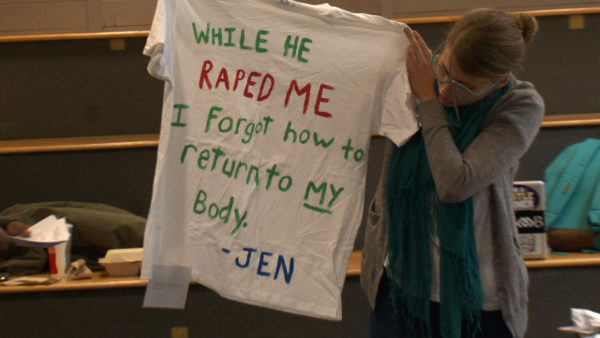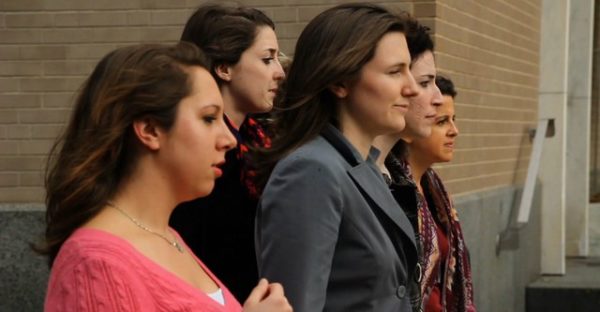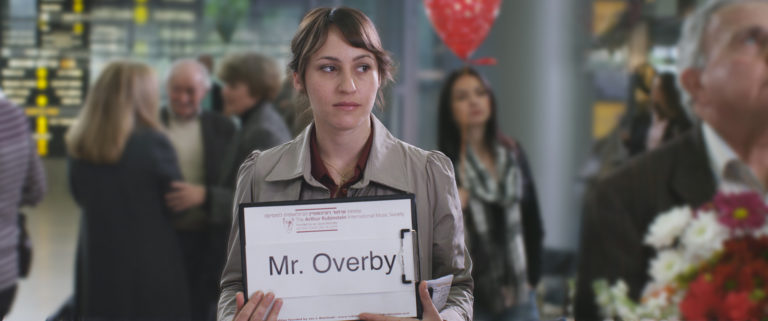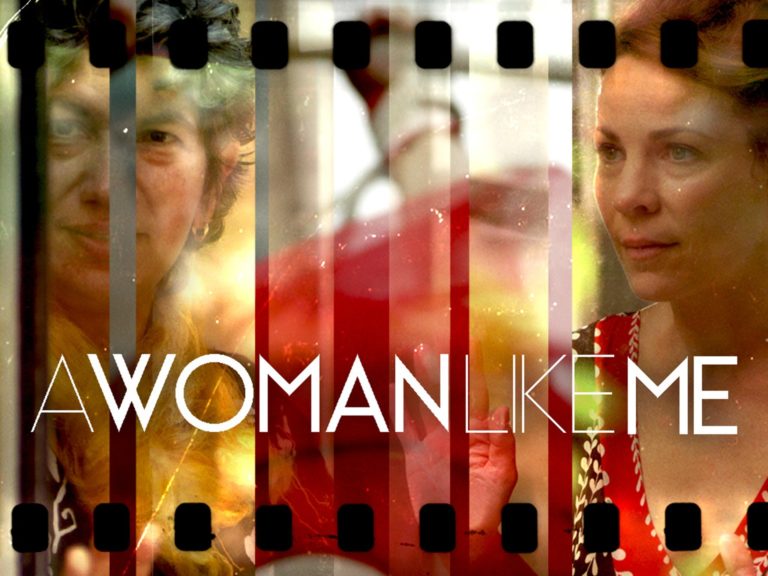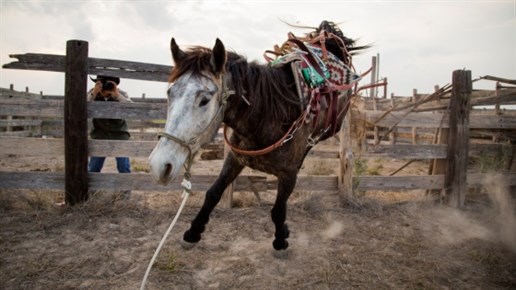It Happened Here exposes the alarming pervasiveness of rape and sexual assault on college campuses, explores the failure of these institutions to take disciplinary action, and follows the burgeoning movement of student survivors breaking the silence around this complex issue and demanding accountability and change, on campus and in federal court. Through the personal testimonials of five student survivors from three schools, the film explores the nature and impact of campus assault on the individual, their family and institution, asking why is sexual assault and “rape culture” so prevalent? What prevention and disciplinary measures are being taken? And are those in power making changes? The Issue The risk of rape victimization on college campuses is one in five women. Thousands of students are sexually assaulted every school year, but it’s impossible to know how vast the problem actually is as less than 20% of these crimes are reported. The first six weeks of college are considered a “red zone” for incoming freshmen; that’s when freshman women are particularly at risk for sexual assault. These young men and women wander into new lives unprepared and uninformed, away from previous support systems, parental supervision and boundaries. For most, college is the first experience with independence; identities are not yet firm, and many students are vulnerable to social pressures from new peers in a highly sexualized environment. New arrivals often take risks to be accepted and fit in. When it comes to reporting, student victims anticipate, and are often met with, humiliation, blame, apathy and disbelief. Lack of proof, fear of reprisal from the perpetrator and fear of hostile treatment by police and administrators re-traumatizes students into silence. Survivors often fall into debilitating depressions, many drop out of school and there have been multiple suicides at colleges across the country. In the real world, people go to jail for these crimes. But even as the issue gains national attention, colleges are still reluctant to address the problem: there are serious legal implications, allegations can tarnish the school brand and reputation, and controversy hinders the ability to fundraise. So the cover up continues, until one survivor spoke up. It begins with a letter. Our Subjects On October 11, 2012, Angie Epifano, a sophomore at Amherst College, documented her experience and treatment after her sexual assault by a fellow student, and it was published in the school newspaper. Angie’s letter sent shockwaves through campuses around the country and abroad. Suddenly, hundreds, then thousands of men and women responded (to date over a million), confiding their own experiences, crashing Amherst’s server, and a nationwide movement was born. Angie received a full scholarship to Amherst, an anomaly for a student athlete from her small town in Northern Florida where leaving home means joining the military. In August ’09, Angie began Amherst with the promise of a bright future. On May 25, 2010 Angie was raped in a campus dorm. For months she suffered in silence until a friend found her despondent and convinced her to get help. But when Angie went to school counselors, she was met with disbelief and dismissal. They told her to “forgive and forget” and “he’s graduating so there’s not much we can do”. Like many survivors, Angie withdrew from school. Her assailant, who assaulted other students after Angie’s departure, graduated with honors. In response to Angie’s letter, Amherst President Carolyn Biddy Martin launched a special task force to investigate the college’s policies around sexual assault. Dr. Martin spoke to It Happened Here about what schools can and must do to address sexual violence on campus, the culture surrounding assault and how sexual assault on campus did not start with this generation, and cannot be written off to “hooking up”. We followed Angie to NYC in August ’13 where she worked two jobs and reached out to dozens of schools, offering to speak about her experience. In the fall of ’13 we filmed Angie on her national speaking campaign at Harvard, Northwestern, Drexel and UMass where she met with students, administrators, faculty, athletic departments and law enforcement, to expand what is becoming a nationwide conversation. While at Harvard, we filmed Dean of Undergraduate Students Dr. Jay Harris who explains the limited ability of schools to respond to complaints, and Harvard’s efforts to address these issues. On November 13, 2013, we filmed Angie filing Clery and Title IX complaints against Amherst, along with our other subjects, who united to file against their schools. In August 2013, we filmed UConn alumna nurse Kylie Angell at The University of Connecticut Storrs where she graduated June ’13 with a degree in nursing. She recounted her lonely freshman year when she didn’t drink, go to parties or hook up. By sophomore year Kylie, looking to socialize, accepted an invitation to a party where she drank for the first time. That night she was sexually assaulted. Kylie takes us around U Conn’s campus and shows us where she was assaulted twice in five years. She describes her confusion and guilt, and the renewed trauma of seeing her assailant back on campus after appealing, and overturning, his expulsion. A scholarship student in a specialized five-year program, Kylie couldn’t transfer. When she reported her second assault to Storrs Police she was told “if women would stop spreading their legs like peanut butter rape wouldn’t happen.” This insult to injury impelled her to take legal action and galvanized her activism. We filmed Kylie at work and at home where she lives with her parents Mr. and Mrs. Angell who spoke to us about the impact of their daughters experience and activism, and UConn’s response to their own involvement on their daughters behalf. Kylies close friend and recent UConn graduate Carolyn Luby, (Dec. ’13) walked us along the fabled “rape trail”, a short cut to class by day, a treacherous path at night where assaults are known to take place. An outspoken activist, Carolyn wrote an open letter to UConn President Susan Herbst challenging the University’s “rape culture”, questioning the suitability of the aggressive imagery of the new Husky mascot. As a result, she received hundreds of violent threats (“I hope you get raped by a husky”) and web sites like Bar Stool Sports devoted pages to slandering her for speaking out. Rush Limbaugh ridiculed her claims on his radio show, where her parents learned for the first time about their daughter’s victimization. We filmed Carolyn showing us the dilapidated houses where day drinking turns into night drunkenness, and the weekend parties where assaults take place. We returned to UConn on Halloween for the biggest party night of the year and filmed the campus transforming from idyllic, esteemed, academic institution into an intimidating environment that puts unknowing students at risk. In April ’13, Erica Daniels, a junior at UConn, was drugged and raped by a trusted co-worker and friend who then harassed and stalked her. Erica was forced to leave her campus job while he was promoted to manager. We met with Erica over the course of 12 months and followed her from awareness of her rights to taking legal action. Mr. and Mrs. Daniels express their sadness, disappointment and frustration at UConns handling of their daughters case…and how their daughter has never been the same since her assault. In November ’13, we traveled to Hartford CN where these three women testified in federal court against UConn’s failures to comply with Title IX and Clery, and again when they appeared before the Connecticut State legislature. As a result of their complaints and testimony, UConn is now under investigation by the Office of Civil Rights, and Conn. state senate has drafted new legislation protecting students. Represented by attorney Gloria Allred, their case against UConn was settled in July ’14 for 1.3 million. We requested and were refused an interview with Dr. Susan Herbst, the first female president of the UConn, Storrs, who denied any wrongdoing and called the complainants “astonishingly misguided” and their allegations “demonstrably untrue”. Threatened with a cut to their federal funding, UConn Police Chief Barbara O’Connor conducted an inquiry into police procedures and found 75 places for improvement. On September 19, 2013 It Happened Here travelled to Nashville, Tenn. to interview Sarah O’Brien, a senior scholarship athlete and student survivor at Vanderbilt University. When Sarah arrived at Vandy, she thought she was safe within the athletic community that recruited her. But in her sophomore year, a trusted student athlete friend raped her after a party. Sarah tells us about the extreme and crushing betrayal “when one of your own – we were told we were a family, we live and eat together, we watch out for each other—does this to you”. Sarah organized other survivors and is the first at her school to come forth and take legal action. She is currently attending Vanderbilt Divinity School to pursue social justice, and founded Dara House—a resource and residential facility for student survivors. We filmed Sarah staging events such as “Take Back the Night” and “The Clothesline Project” on campus, and delivering a list of demands to the Dean of Students Mark Bandes. Sara toured us through the athletes’ dorms where 5 football players were arrested for rape in June ’13, and the frat houses and party culture that fosters sexual violence on campus. We were in Nashville again with Sarah Nov ’13 when she filed a Title lX and Clery Complaint against Vanderbilt. As a result of Sarah’s activism, Vanderbilt is under federal investigation by the DOE, and their policies and procedures are currently under review. Even though statistics show that between two to eight percent of claims are false, (the same for most other crimes) we interviewed secular conservative and civil rights scholar Heather MacDonald of the Manhattan Institute, whose article The Myth of Campus Rape challenged the statistics on sexual assault on campuses and the stories of student survivors. MacDonald attributes assaults to the “hook up culture” and relaxed sexual and social mores for what she believes are blurred lines of consent. Many victims can’t conceptualize these events as “rape”; they don’t know what to make of their assault. The confusion and betrayal of an attack by teammates, classmates and dorm mates destroys the sense of self. According to a 2010 Department of Justice study over 85% of sexual assaults on campus are perpetrated by students the victims know, so survivors don’t define it in legal terms. They don’t call it rape. Forensic Psychologist Dr. David Lisak, a member of the White House Task Force who has researched rapists, clarifies the real problem, predation, and how serial offenders move forth with impunity and must be investigated as police would all other crimes. All of the students we work with struggle with PTSD and other mental health issues. Angie describes her social withdrawal and slide into depression. Kylie’s GPA dropped precipitously after her assault; Carolyn and Erica are hyper-vigilant and avoid campus as best they can. We interviewed Karestan Koenen, M.A., Ph.D., a licensed clinical psychologist and professor at Columbia University who specializes in sexual trauma and post-traumatic stress disorder. Koenen speaks to the clinical manifestations and long lasting repercussions of assault, and the importance of believing and supporting survivors. As students learn they have rights by law, they begin the arduous and daunting process of filing complaints with Department of Education Office of Civil Rights. Title IX is one of the strongest tools for survivors to demand enforcement, but few women know to use it and can’t afford attorneys. Harvard Law School lecturer and Title IX expert (and Angie’s attorney) Diane Rosenfeld frames our understanding of the factors that influence a victim’s decision to pursue legal action, and what they can expect as they move through the judicial system. But legal response can only go so far. It Happened Here hones in on the broad social forces and organized belief systems that contribute to the epidemic of sexual violence on campus. On February 12, 2014, we filmed Dr. John Foubert, the founder of One in Four, a national movement to eliminate violence, at Chapman University. He presented his prevention program to a group of students where he identifies the casual, toxic language, humor and behavior that void sensitivity to rape and survivors. Foubert’s programs compel students to re-evaluate their own attitudes and behavior. He helps educate students to the dangerous behavior that portends sexual violence. Dr. Foubert’s prevention programs have proven to be one of the few effective means of creating awareness and empathy, the cornerstones of change and prevention. It Happened Here sheds much needed light on this shocking epidemic, will expand the national discourse to focus attention on meaningful and significant change, and help make our campuses free of sexual violence, and create a culture of respect.
Summary info for schedule – will be hidden on film page
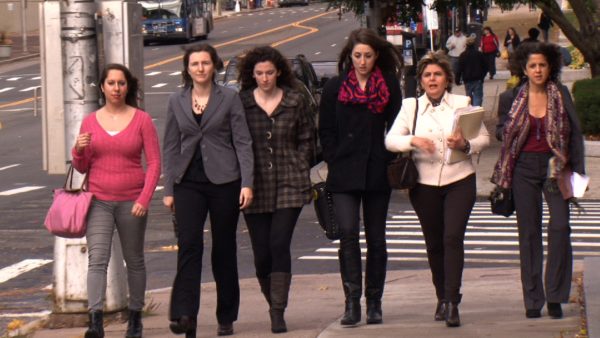
It Happened Here
75-minutes
Screening day / time
It Happened Here
It Happened Here
Filmmaker Notes:
I’ve been working in film production and as screenwriter for over thirty years. However, nothing comes close to the humility, pride and gratitude I felt working with five remarkable women who let me into their lives and shared their stories. As the parent of two college students who toured dozens of schools, and a volunteer in the non-profit sector helping under privileged students get into college, I thought I knew everything about campus life. It wasn’t until a friend alerted me to the pervasiveness of sexual assault in college, and how her family had been directly affected, that I first learned about this shocking epidemic. Work on IT HAPPENED HERE began immediately with research and a call to director Lisa F, Jackson. Lisa’s films on sexual violence have had tremendous impact on communities and legislators—creating tangible change through storytelling. I tracked down Angie Epifano, a former student at Amherst College whose letter to her school paper about her experience launched a nationwide conversation. Filming began one week later. The courageous women at End Rape On Campus (EROC) and Know Your lX put me in touch with Kylie, who led me to Carolyn and Erica. These three women were taking action against the University of Connecticut, a state school where “rape culture” and division one sports prevail, while the administration had failed their student survivors. I was very fortunate to find Sarah, a lone voice in a silencing southern school with a dominating Greek life. Sarah was a student athlete betrayed by athletes. She was the first to come forth and take action against her school. Sarah’s activism has led to revisions of Vanderbilt’s policies and practices, and she continues to work for change. These five women continue to humble and impress me. I hope their stories will inspire and encourage others to break the silence surrounding campus assault, and work towards safety on campus and a culture of accountability and respect. Marjorie Schwartz Nielsen, Producer

